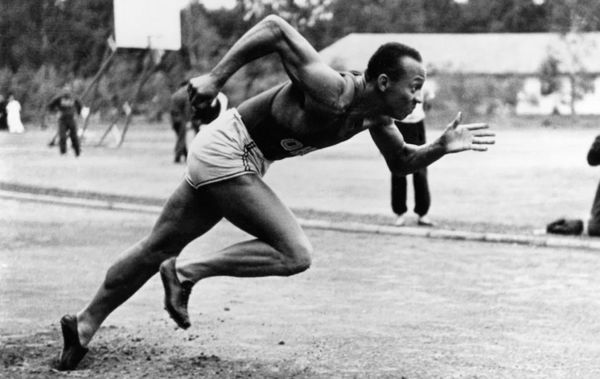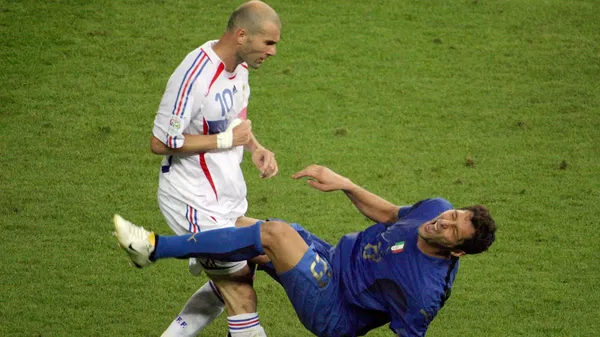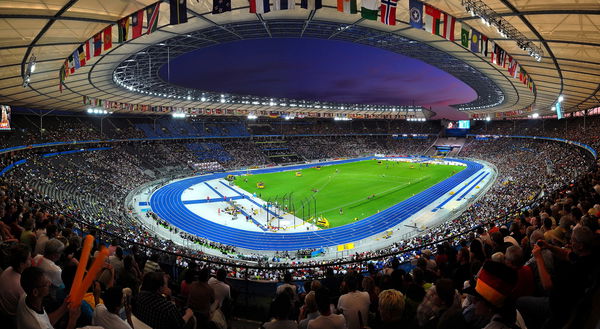The stage is all set in Berlin. The most fluent side in the Euros so far, Spain, will be bidding to win their fourth international trophy against the Three Lions, who managed to survive whatever hurdles the tournament put in their path aiming to end their 58-year trophy drought. Nonetheless, what’s set to be a compelling clash will be witnessed by fans in 74,475 seats with an addition of millions cheering all over the world. And the venue is the Olympiastadion, aka Olympia Stadium, which has been involved in a few notable historical events and a murky past with the scars of the Nazi-World War 2 era.
Watch What’s Trending Now!
Being hosts to various events, especially in sports including the Olympics and the World Cup, the stadium stands tall as a symbol of Germany’s democratic rejuvenation despite all the tumultuous past. Let’s delve deeper into the significant moments the stadium has been backdrop to.
ADVERTISEMENT
Article continues below this ad
1936 Olympics- Jesse Owens’ 4 gold medals
The flame was lit on the Olympic cauldron amidst rising global tensions in 1936. Olympiastadion was originally designed for this Summer Olympics by the Nazi government. Located on the western edge of Berlin, this architectural feat had one of the most memorable events in sports history; the USA’s African American athlete Jesse Owens winning his record four gold medals in 100m, 200m, long jump, and 4*100 relay.
ADVERTISEMENT
Article continues below this ad

In German, there’s a word for striving to overcome the past- Vergangenheitsbewältigung. It is as difficult as it reads. Well, that is what happened in the case of this stadium which coped with its tainted past and underwent a revamp for the better. In the post-war era, it had a revamp in construction, hosted polo events, and became home to the Hertha BSC football club. It also had 3 matches in the 1974 World Cup where West Germany rose as champs.
What’s your perspective on:
Will the Stade de France witness another unforgettable moment like Zidane's headbutt in the Euro Final?
Have an interesting take?
2006 World Cup final- Zidane’s headbutt, a stormy end to a sagacious career
French legend Zinedine Zidane is not known to be a hot-head. Yet, on July 9th, 2006, when his team was in a 1-1 tie, in the World Cup final against Italy, Zizou gave in to the provocation by Marco Materazzi, a crass comment mentioning the Frenchman’s sister. In the 111th minute, the Real Madrid icon smashed his head into Materazzi’s ribcage, earning a red card. The match went into a penalty shootout, which was won by Gli Azzurri for 5-3. That marked the end of Zidane’s stellar international career.

The incident remains so iconic that it was made into a statue in the 2022 World Cup. For the fans, it was indeed a sad moment although Zizou had won them a World Cup already in 1998.
Olympiastadion also hosted the 2009 World Championship in Athletics where the extra-ordinary Usain Bolt broke the world record for 100m and 200m, and the 2011 FIFA Women’s World Cup’s opening match between Germany and Canada.
ADVERTISEMENT
Article continues below this ad
2015- UEFA Champions League Final- Barcelona’s treble-winning triumph beating Juventus
The 2014-15 season was world domination for Barca. Lionel Messi’s team completed their second treble winning the coveted trophy, beating the Bianconeri 3-1. Interestingly, the one and only goal of Juve was scored by the current captain of La Roja, Alvaro Morata. Will today end up differently for Morata at the Olympiastadion?
Time flew by. The Olympiastadion redefined what it represents. It also hosted many famous concerts by the Rolling Stones, Michael Jackson, Madonna, Ed Sheeran etc. Now it is all prepared and adorned to be home for another historic night in football. So who do you think will have the last laugh?
ADVERTISEMENT
ADVERTISEMENT
ADVERTISEMENT
ADVERTISEMENT





Will the Stade de France witness another unforgettable moment like Zidane's headbutt in the Euro Final?